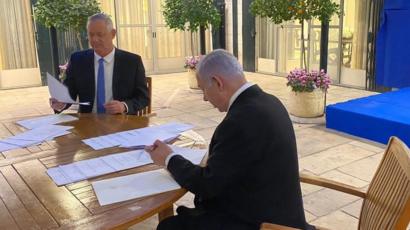Rotation, annexation et al: Key elements
of the Netanyahu-Gantz coalition deal
Agreement envisages vote on West Bank
annexation in July, gives right-wing veto power on panel that chooses judges,
provides for new elections if High Court bars Netanyahu as PM
Blue and White leader
Benny Gantz (left) and Prime Minister Benjamin Netanyahu sign their unity
government agreement on April 20, 2020. (GPO)
The “emergency national unity government” that Prime Minister
Benjamin Netanyahu and Blue and White leader Benny Gantz agreed to promises to
finally put an end to the political deadlock that has afflicted Israel since
the Knesset dissolved at the end of 2018.
Since then, Israel has held three tightly fought elections, in
which Gantz battled to oust Netanyahu; last month, amid the coronavirus
pandemic, Gantz broke his pledge not to join Netanyahu in government and began
negotiating the deal that was accepted and published on Monday night.
Among the main elements of the 14-page agreement:
The government will serve for 36 months, with Netanyahu
remaining prime minister for the first 18 months and then handing the position
over to Gantz. This transfer of power will happen automatically, without
requiring a separate vote or decision. Each man will be the other’s “acting
prime minister.” An official residence will be provided for the acting prime
minister.
The government will initially have 32 ministers — divided
equally between the Netanyahu- and Gantz-led blocs.
The coalition is initially likely to
number 72 MKs. (Netanyahu’s bloc comprises Likud, with 36 MKs; Shas with 9,
United Torah Judaism with 7, and Orly Levy-Abekasis’s 1, for a total of 53 MKs.
It is not yet clear whether Yamina, with 6 MKs, will join the coalition.
Gantz’s bloc comprises his Blue and White, with 15, Derech Eretz’s Zvi Hauser
and Yoaz Hendel, and Labor’s Amir Peretz and Itzik Shmuli, for a total of 19
MKs.)
After six months, when it is hoped the
coronavirus crisis will be over, the government will swell to 36 ministers,
again divided equally — making it the largest government in Israeli history.
Each bloc will also be able to appoint up to eight deputy ministers. (Parties
will be able to utilize the so-called Norwegian Law — under which a minister
steps down from the Knesset, and the next person on the party’s list takes up
the seat instead.)
For its first six months, the coalition
will focus on tackling the pandemic, and will not pass major legislation that
does not relate to the crisis. It will also not make major appointments to key
positions that require government approval, such as the attorney general and
police commissioner. In the course of those six months, the sides will negotiate
the platform for the coalition for the rest of its lifespan.
From July 1, 2020, however, Netanyahu
will be allowed to have the government and/or the Knesset vote on annexing
parts of the West Bank, on the basis of the Trump administration’s peace plan.
Such a vote would be held “as quickly as possible,” the agreement states, with
no delays at the committee stages. Although coalition members will be able to
vote as they see fit, the pro-annexation camp in the Knesset is likely to enjoy
a majority.
The coalition agreement features several
complex clauses designed to insure that the prime ministership is indeed handed
over as agreed — with provisions intended to prevent Netanyahu maneuvering to
avoid transferring the job of prime minister to Gantz — some of which will
require new or amended legislation. If Netanyahu dissolves parliament in the
first 18 months, the deal indicates, Gantz would take over as prime minister
for a protracted interim period before elections.
Similarly, the agreement features clauses
designed to ensure that if the High Court of Justice rules in the coming six
months that Netanyahu cannot serve as prime minister because of the indictments
against him, the Knesset would dissolve, and new elections would be held, with
Gantz serving as prime minister during the interim period.
In a victory for the ultra-Orthodox
factions, the agreement provides that the government, rather than the Knesset,
will set the quotas for IDF conscription among ultra-Orthodox males.
The Israeli ambassador to the US will be
appointed by whoever is prime minister. Other senior ambassadorial positions —
the envoys to the UN, UK, Australia and France — will be appointed by Netanyahu
and will not change when Gantz takes over.
The committee that chooses Israel’s judges
will feature potential right-wing veto power, with Hauser, a former cabinet
secretary under Netanyahu, to be appointed to the panel. This had been one of
the main bones of contention during the negotiations.
Though a right-wing conservative who is
unlikely to back judicial activism, Hauser has also been critical of attacks on
the courts and is considered by Gantz and his allies to be a defender of the
judiciary’s independence.
Meanwhile, Blue and White’s Avi
Nissenkorn is set to be appointed justice minister, replacing the firebrand
Amir Ohana of Likud who had made a habit of attacking the courts and the state
prosecution.
The speaker of the Knesset will be Likud
MK Yariv Levin. Gantz, the current Knesset speaker, had insisted that Yuli
Edelstein, who defied a High Court order to hold a vote on the post, not return
to the position. Levin is a prominent critic of the court, and a supporter of
legislation to rein in its powers.
However, the Knesset House Committee,
which has great influence over parliament’s legislative agenda, will be
controlled by Blue and White.

No comments:
Post a Comment